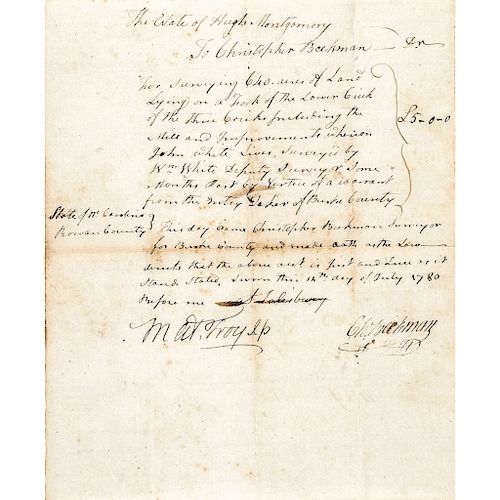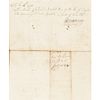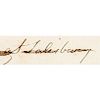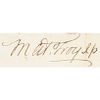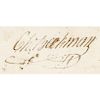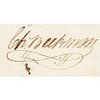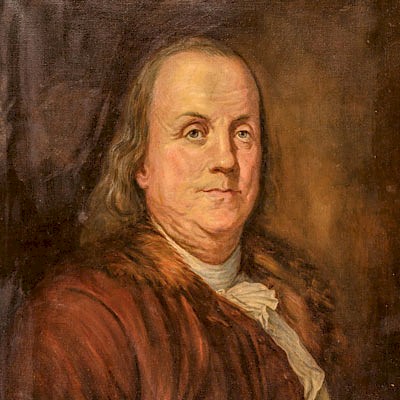1780 North Carolina Rev. War Oath Signed By Matthew Troy + Christopher Beekman
Lot 150
Estimate:
$500 - $700
Absentee vs Live bid
Two ways to bid:
- Leave a max absentee bid and the platform will bid on your behalf up to your maximum bid during the live auction.
- Bid live during the auction and your bids will be submitted real-time to the auctioneer.
Bid Increments
| Price | Bid Increment |
|---|---|
| $0 | $10 |
| $200 | $20 |
| $300 | $25 |
| $500 | $50 |
| $1,000 | $100 |
| $2,000 | $200 |
| $3,000 | $250 |
| $5,000 | $500 |
| $10,000 | $1,000 |
| $20,000 | $2,000 |
| $30,000 | $2,500 |
| $50,000 | $5,000 |
| $100,000 | $10,000 |
| $200,000 | $20,000 |
| $300,000 | $25,000 |
| $500,000 | $50,000 |
About Auction
By Early American History Auctions
Aug 24, 2019
Set Reminder
2019-08-24 12:00:00
2019-08-24 12:00:00
America/New_York
Bidsquare
Bidsquare : Autographs, Colonial Currency, Political Americana, Historic Guns
https://www.bidsquare.com/auctions/early-american-history-auctions/autographs-colonial-currency-political-americana-historic-guns-4347
Historic Autographs • Colonial Currency • American Civil War Colonial Era • Revolutionary War • Political Americana • Black History Early American History Auctions auctions@earlyamerican.com
Historic Autographs • Colonial Currency • American Civil War Colonial Era • Revolutionary War • Political Americana • Black History Early American History Auctions auctions@earlyamerican.com
- Lot Description
American Revolution
1780 Estate of Colonel Hugh Montgomery (Relative of General Richard Montgomery, Killed at the Battle of Quebec, 1775) Rowan County, North Carolina Survey of His Lands Oath
July 14, 1780-Dated Revolutionary War Period, Two Notable Figures Signed Manuscript Document Signed, Ch.(ristopher) Beekman, and Matthew Troy, being a Payment Oath for Services Rendered, Surveying Lands of Colonel Hugh Montgomery (Relative of General Richard Montgomery, Killed at the Battle of Quebec, 1775) Rowan County, North Carolina, Choice Very Fine.
July 14, 1780-Dated, Revolutionary War Period, Manuscript Document, 1 page, measuring 7" x 8.75", Rowan County, North Carolina. An original Document, where Matthew Troy (1750-1790) has signed this Oath given by Christopher Beekman, swearing that he is owed 5 Pounds for surveying the lands of Hugh Montgomery. Signed on front by Matthew Troy and Christopher Beekman. Also noted and Signed on blank back by Christopher Beekman stating, "Sum Receivd. of David Nesbit of the Ea(state) of Hugh Montgomery Dec.(eased) Five Pounds in full of this Ac. (account) - (Signed) Ch. Beekman". Plus Docket on lower portion dated July 14, 1780 as having received the funds. A nice official North Carolina historic document signed by Two notable Revolutionary War Patriots, regarding yet an even more famous third!
Matthew Troy (1750-1790) was a Town Commissioner of Salisbury, North Carolina in 1770. He had been living with Michael Troy in Lancaster County, PA, before that.
In 1775, the North Carolina Council of Safety resolved that Matthew Troy and others report what store of powder, flint and lead they had on hand. In 1775, it was resolved the Committee of Safety that Matthew Troy deliver all powder in his possession belonging to one Kelly, and that the Council indemnify Troy, and that he be given a copy of the resolution.
In 1775, the Board of War resolved to write Matthew Troy regarding the supply of salt for Rowan County. In 1775, Matthew Troy was appointed a member of the Committee of Secrecy, Intelligence, and Observation, for Rowan County and the Town of Salisbury, North Carolina. The same year, the Safety Committee of Rowan County bought from him twenty pounds of lead at 10 pence.
Also in 1775, the Provincial Council of North Carolina resolved that Matthew Troy be authorized and appointed to employ proper persons to build carriages for four cannon then at New Bern, North Carolina and remove them to Salisbury for the defense of the Province, and that the Treasurers' pay to Matthew Troy for this the sum of forty pounds.
In 1778, Matthew Troy qualified as a Member of the North Carolina House of Commons as representative of the Town of Salisbury. The same year, Matthew Troy was made a Justice of the Peace, by Ordinance of the Convention of 1776.
In 1784, Matthew Troy and others incorporated as Trustees of Salisbury Academy by Act for the Encouragement of Learning, etc., by the Legislature of North Carolina. In 1787, Matthew Troy was Justice of Police in Rowan County, North Carolina.
Colonel Hugh Montgomery (1727-1779) was Prominent among the names of the Committee of Safety of Rowan County. He was a native of Ireland. At an early age he fell in love with a Miss Moore, who was of noble birth. This relationship was strongly opposed by her friends, but the attachment was reciprocated, and she was Conveyed Secretively on board a Ship where she met her lover Hugh Montgomery and they were married. The youthful pair escaped in safety to America, a near relative to the famous British General Richard Montgomery, who fell at the Battle of Quebec, in 1775.
Hugh Montgomery settled first in Pennsylvania, and afterwards removed to Salisbury, North Carolina. He was constant and active in promoting the cause of Independence and was one of the most fixed and forward of the daring Patriots of that day. Hugh at this time was also a Member of the Provincial Congress in addition to his being a member of other committees. In spite of his age, he served briefly in the militia during the Revolutionary War.
By his enterprise and industry he amassed a handsome fortune. He died in Salisbury Dec. 23, 1779, leaving one son and seven daughters.
CHRISTOPHER BEEKMAN, b. Abt. 1740; d. New York. Christopher was Surveyor General in North Carolina. He went back to Princeton, NJ and died in New York.
On 11/11/1775, Christopher Beekman was nominated for a commission as a Captain under Col. Adlai Osborne in the newly-created 2nd Rowan County Regiment.
Either in late 1775 or very early 1776, Christopher Beekman was commissioned as a Lt. Colonel under Col. Adlai Osborne in the 2nd Rowan County Regiment. He led this regiment eastward in February of 1776, but they were all too late for the battle of Moore's Creek Bridge (2/27/1776).
Christopher Beekman was commissioned as Colonel/Commandant on 4/22/1776 over the 2nd Rowan County Regiment of Militia, replacing Adlai Osborne, who resigned. Colonel Christopher Beekman led his regiment under Brigadier General Griffith Rutherford on the Cherokee Expedition of August to November 1776.
- Shipping Info
-
Early American provides in-house worldwide shipping. Please contact us directly if you have questions about your specific shipping requirements.
-
- Buyer's Premium



 EUR
EUR CAD
CAD AUD
AUD GBP
GBP MXN
MXN HKD
HKD CNY
CNY MYR
MYR SEK
SEK SGD
SGD CHF
CHF THB
THB